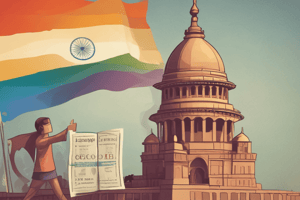Podcast
Questions and Answers
Which part of the Indian Constitution deals with Fundamental Rights?
Which part of the Indian Constitution deals with Fundamental Rights?
- Part IV
- Part II
- Part III (correct)
- Part V
The Right to Equality is guaranteed under which Articles of the Indian Constitution?
The Right to Equality is guaranteed under which Articles of the Indian Constitution?
- Articles 14–18 (correct)
- Articles 19–22
- Articles 12–14
- Articles 15–18
Which of the following is not a Fundamental Right under the Indian Constitution?
Which of the following is not a Fundamental Right under the Indian Constitution?
- Right to Freedom of Religion
- Right to Constitutional Remedies
- Right to Equality
- Right to Property (correct)
Which Fundamental Right prohibits human trafficking and forced labor?
Which Fundamental Right prohibits human trafficking and forced labor?
The Right to Constitutional Remedies is enshrined in which Article of the Constitution?
The Right to Constitutional Remedies is enshrined in which Article of the Constitution?
Which Fundamental Right guarantees the freedom to practice, profess, and propagate religion?
Which Fundamental Right guarantees the freedom to practice, profess, and propagate religion?
What does the Right to Education ensure under the Indian Constitution?
What does the Right to Education ensure under the Indian Constitution?
Which Article of the Constitution abolishes untouchability?
Which Article of the Constitution abolishes untouchability?
Flashcards
What part of the Indian Constitution deals with Fundamental Rights?
What part of the Indian Constitution deals with Fundamental Rights?
Part III of the Indian Constitution outlines the fundamental rights, which are the basic human rights guaranteed to every citizen. These rights protect individuals from state interference and ensure their freedom and dignity.
Which Articles of the Indian Constitution guarantee the Right to Equality?
Which Articles of the Indian Constitution guarantee the Right to Equality?
Articles 14-18 of the Indian Constitution guarantee the Right to Equality. This fundamental right ensures that all individuals are treated equally before the law and prohibits discrimination based on religion, race, caste, sex, or place of birth.
Which of the following is not a Fundamental Right under the Indian Constitution?
Which of the following is not a Fundamental Right under the Indian Constitution?
The Right to Property was initially a Fundamental Right, but it was removed from Part III of the Constitution in 1978. It was replaced by a legal right under Article 300A.
Which Fundamental Right prohibits human trafficking and forced labor?
Which Fundamental Right prohibits human trafficking and forced labor?
Signup and view all the flashcards
The Right to Constitutional Remedies is enshrined in which Article of the Constitution?
The Right to Constitutional Remedies is enshrined in which Article of the Constitution?
Signup and view all the flashcards
Which Fundamental Right guarantees the freedom to practice, profess, and propagate religion?
Which Fundamental Right guarantees the freedom to practice, profess, and propagate religion?
Signup and view all the flashcards
What does the Right to Education ensure under the Indian Constitution?
What does the Right to Education ensure under the Indian Constitution?
Signup and view all the flashcards
Which of the following rights can be suspended during a National Emergency?
Which of the following rights can be suspended during a National Emergency?
Signup and view all the flashcards
Study Notes
Fundamental Rights in the Indian Constitution
- Part III of the Indian Constitution deals with Fundamental Rights.
- Right to Equality, covered in Articles 14–18, prohibits discrimination based on various factors.
- Right to Freedom (articles 19–22) includes freedoms like speech, assembly, and movement. It also prevents arbitrary arrest and detention.
- Right against Exploitation, prohibits human trafficking and forced labor and is covered in Articles.
- Right to Freedom of Religion is a fundamental right. This is in articles.
- Cultural and Educational Rights aim at protecting the rights of religious and linguistic minorities.
- Right to Constitutional Remedies (Article 32) allows individuals to approach the Supreme Court for enforcement of fundamental rights.
- Right to Life and Personal Liberty (Article 21) is crucial in ensuring personal freedom.
- Right to Education (enshrined in the amendment) ensures free and compulsory education for children aged 6-14. This is not covered in the original constitution.
- Right to Property is NOT a Fundamental Right
- Untouchability is abolished under Article 17.
- Freedom of Speech and Expression (Article 19) protects criticizing the government, not inciting violence or defamation. Freedom of speech and expression does not include the ability to disrespect the constitution.
- Suspending Fundamental Rights, during a national emergency, specific rights can be temporarily suspended like freedom (but not equality or against exploitation).
- Discrimination, is forbidden by the right to equality on the basis of religion and gender (among others)
Studying That Suits You
Use AI to generate personalized quizzes and flashcards to suit your learning preferences.




